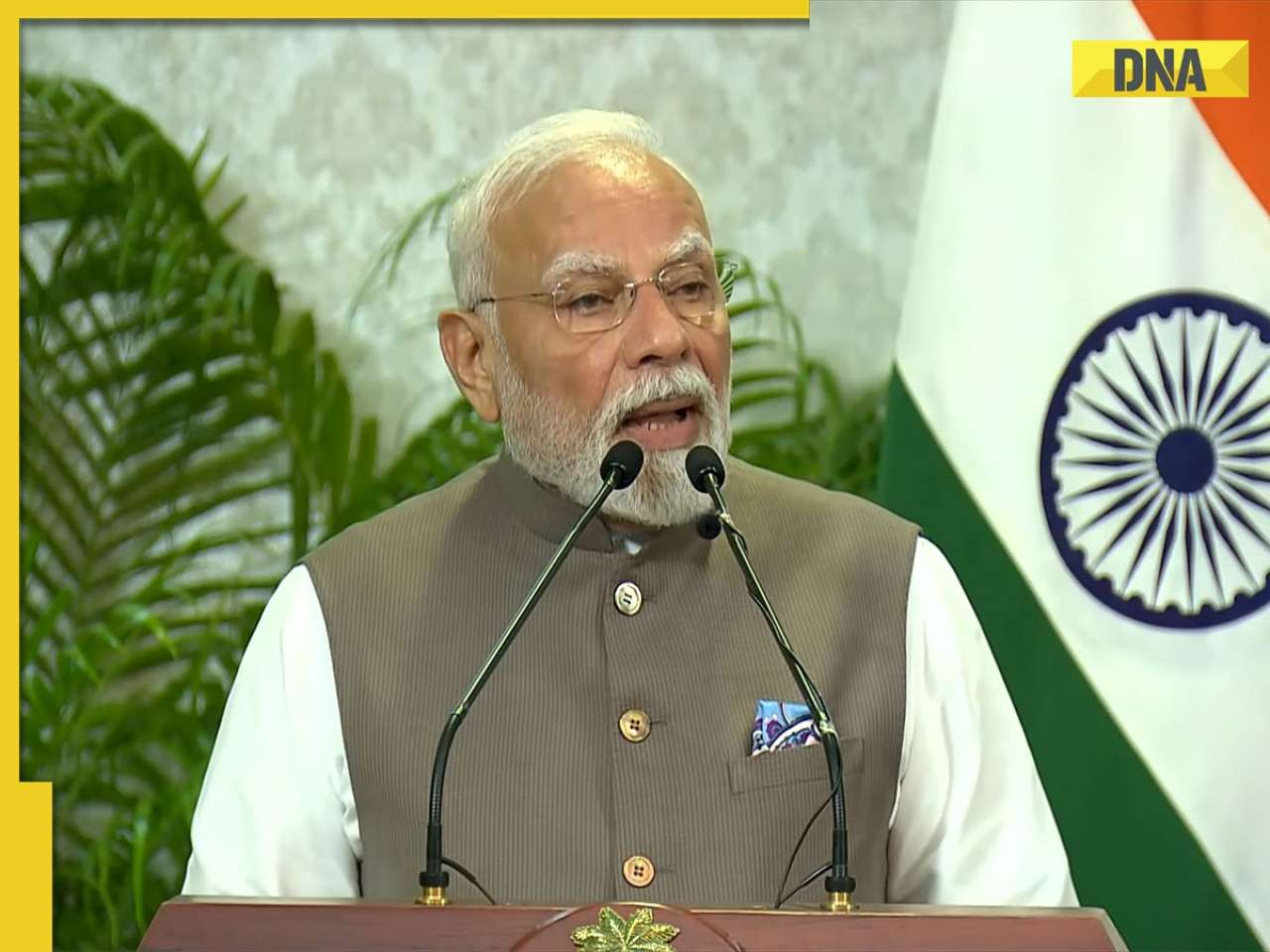If reports are to be believed, air conditioners account for around 50 gigawatts of electricity use, about one-fifth of the country’s maximum power load. It has also been found that every 1°C increase in AC temperature cuts energy use by 6%.
In what may appear as increasing control of your everyday life, soon the government may dictate you to run your air conditioners within a range of temperatures. The Union government is working on legislation that may issue instructions to run air conditioners in the range of 20 degrees and 28 degrees Celsius. It means you must not put your air conditioners below the temperature of 20 degrees Celsius. This instruction will have to be followed in both individual homes as well as public places like officers and hotels etc.
Govt's move to save electricity
If reports are to be believed, the government intends to save electricity so that the rising energy demand and consumption of electricity during the peak period are maintained properly. Attending a programme in New Delhi, Union Power Minister Manohar Lal Khattar said, "Regarding air conditioning standards, a new provision is being implemented soon. The temperature standardization for ACs will be set between 20°C to 28°C, meaning we won't be able to cool below 20°C or warm above 28°C." He added, "This is a first-of-its-kind experiment, aiming to standardize temperature settings."

Do you run AC at 16 degrees Celsius?
The government seems to have taken the decision keeping in mind the fact that many homes and buildings run their ACs at very low temperatures, sometimes as low as 16°C. It consumes more electricity and puts extra pressure on the power grid. According to a rough estimate, India has around 100 million ACs. Besides, about 15 million more air conditioners are installed every year.
What will happen if you increase temperature?
If reports are to be believed, air conditioners account for around 50 gigawatts of electricity use, about one-fifth of the country’s maximum power load. It has also been found that every 1°C increase in AC temperature cuts energy use by 6%. It means if everyone sets their ACs just 1 degree higher, about 3 gigawatts of power can be saved during the peak period.
According to the University of California, Berkeley, stricter electricity rules can save up to 60 gigawatts of peak demand by 2035. It can save about Rs 7.5 trillion on building new power plants and grid systems.
Find your daily dose of All
Latest News including
Sports News,
Entertainment News,
Lifestyle News, explainers & more. Stay updated, Stay informed-
Follow DNA on WhatsApp. Saif Ali Khan stabbing case: Mumbai Police opposes accused Mohammad Shariful Islam's bail plea, details inside
Saif Ali Khan stabbing case: Mumbai Police opposes accused Mohammad Shariful Islam's bail plea, details inside DNA TV Show: EC to launch nationwide voter list overhaul exercise, but what is its purpose?
DNA TV Show: EC to launch nationwide voter list overhaul exercise, but what is its purpose? Saiyaara box office collection day 8: Ahaan Panday, Aneet Padda film continues steady run, inches towards Rs 200 crore in India, earns...
Saiyaara box office collection day 8: Ahaan Panday, Aneet Padda film continues steady run, inches towards Rs 200 crore in India, earns... IND vs ENG 4th Test: Joe Root's record-breaking 150 puts England in command on dominant Day 3, lead India by 186 runs at stumps
IND vs ENG 4th Test: Joe Root's record-breaking 150 puts England in command on dominant Day 3, lead India by 186 runs at stumps This Indian man stole Rs 3.5 lakh worth of items from Singapore Airport, got caught after returning
This Indian man stole Rs 3.5 lakh worth of items from Singapore Airport, got caught after returning Other than heart attacks or BP : 7 hidden heart conditions triggered by oily foods
Other than heart attacks or BP : 7 hidden heart conditions triggered by oily foods 7 most captivating space images captured by NASA you need to see
7 most captivating space images captured by NASA you need to see AI-remagined famous Bollywood father-son duos will leave you in splits
AI-remagined famous Bollywood father-son duos will leave you in splits 7 superfoods that boost hair growth naturally
7 superfoods that boost hair growth naturally Confused between Forex and Credit cards for your international trip? Learn which saves more
Confused between Forex and Credit cards for your international trip? Learn which saves more Tata Harrier EV Review | Most Advanced Electric SUV from Tata?
Tata Harrier EV Review | Most Advanced Electric SUV from Tata? Vida VX2 Plus Electric Scooter Review: Range, Power & Real-World Ride Tested!
Vida VX2 Plus Electric Scooter Review: Range, Power & Real-World Ride Tested! MG M9 Electric Review | Luxury EV with Jet-Style Rear Seats! Pros & Cons
MG M9 Electric Review | Luxury EV with Jet-Style Rear Seats! Pros & Cons Iphone Fold: Apple’s iPhone Fold Could Solve Samsung’s Biggest Foldable Problem | Samsung Z Fold 7
Iphone Fold: Apple’s iPhone Fold Could Solve Samsung’s Biggest Foldable Problem | Samsung Z Fold 7 Trump News: Congress Seeks Answers On Trump's Alleged Mediation In Operation Sindoor
Trump News: Congress Seeks Answers On Trump's Alleged Mediation In Operation Sindoor Jinnah wanted THIS Muslim man to be first Finance Minister of Pakistan, he refused, his son is on Forbes list of billionaires
Jinnah wanted THIS Muslim man to be first Finance Minister of Pakistan, he refused, his son is on Forbes list of billionaires After India-UK FTA, New Delhi to begin talks with THIS country, because...
After India-UK FTA, New Delhi to begin talks with THIS country, because... Indian billionaire Sunil Mittal earns Rs 13499163600 profit from this country, not India, UK; net worth reaches Rs...
Indian billionaire Sunil Mittal earns Rs 13499163600 profit from this country, not India, UK; net worth reaches Rs... UPI Alert! New UPI rules to come in effect from..., know how it will affect GPay, PhonePe, Paytm users
UPI Alert! New UPI rules to come in effect from..., know how it will affect GPay, PhonePe, Paytm users  RBI Governor Sanjay Malhotra makes BIG statement on free UPI transactions, says 'some cost...'
RBI Governor Sanjay Malhotra makes BIG statement on free UPI transactions, says 'some cost...' Ashish Chanchlani looks dashing as he drops latest photos from Italy, fans say 'Tom Cruise fail hai aapke saamne'
Ashish Chanchlani looks dashing as he drops latest photos from Italy, fans say 'Tom Cruise fail hai aapke saamne' Are these five vintage car museums in India a must-visit for every automobile lover?
Are these five vintage car museums in India a must-visit for every automobile lover? Riddhima Kapoor Sahni looks dreamy in pastel gold embroidered ensemble as she walks for Suneet Varma at IWC 2025; SEE PICS
Riddhima Kapoor Sahni looks dreamy in pastel gold embroidered ensemble as she walks for Suneet Varma at IWC 2025; SEE PICS Malaika Arora grabs attention with her street style moment, dons oversized denims, white tank top, luxurious mini bag worth Rs…
Malaika Arora grabs attention with her street style moment, dons oversized denims, white tank top, luxurious mini bag worth Rs… Raksha Bandhan 2025: Bollywood's sweetest 'muh-bole' sibling bonds that celebrate rakhi beyond blood
Raksha Bandhan 2025: Bollywood's sweetest 'muh-bole' sibling bonds that celebrate rakhi beyond blood This company bags Rs 2000 crore contract from Defence Ministry for...; not HAL, Mazagon Dock
This company bags Rs 2000 crore contract from Defence Ministry for...; not HAL, Mazagon Dock PM Modi's BIG message to Maldives, says, 'Whether it's a disaster or...'
PM Modi's BIG message to Maldives, says, 'Whether it's a disaster or...' Good news for first-time employees, set to get Rs…; check eligibility and other details
Good news for first-time employees, set to get Rs…; check eligibility and other details Air India sees another mid-air scare as Mumbai-bound flight returns to Jaipur minutes after takeoff due to...
Air India sees another mid-air scare as Mumbai-bound flight returns to Jaipur minutes after takeoff due to... Delhi-Meerut RRTS: Namo Bharat train timings changed for July 27 due to...; to start at...
Delhi-Meerut RRTS: Namo Bharat train timings changed for July 27 due to...; to start at... Meet Nilufa Yasmine, who topped UGC NET June exam, failed twice before scoring a perfect 100, she is from...
Meet Nilufa Yasmine, who topped UGC NET June exam, failed twice before scoring a perfect 100, she is from... Meet woman, daughter of vegetable vendor who cracked UPSC, her mother mortgaged gold for her education, her AIR is…
Meet woman, daughter of vegetable vendor who cracked UPSC, her mother mortgaged gold for her education, her AIR is… Meet woman, who cracked IIT with full-time job, secured impressive AIR of...; now works at Bill Gates' Microsoft as...
Meet woman, who cracked IIT with full-time job, secured impressive AIR of...; now works at Bill Gates' Microsoft as... Meet woman, couldn't speak English, once worked at Ratan Tata's TCS, cleared ISRO, BARC exams; later cracked UPSC with AIR..., she is...
Meet woman, couldn't speak English, once worked at Ratan Tata's TCS, cleared ISRO, BARC exams; later cracked UPSC with AIR..., she is... Meet woman, 'beauty with brain', who left medical studies, cracked UPSC exam not once but twice with AIR..., she is from...
Meet woman, 'beauty with brain', who left medical studies, cracked UPSC exam not once but twice with AIR..., she is from... Maruti Suzuki's e Vitara set to debut electric market at Rs..., with range of over 500 km, to launch on...
Maruti Suzuki's e Vitara set to debut electric market at Rs..., with range of over 500 km, to launch on... This is world’s most expensive wood, cost of 1kg wood is more than gold, its name is..., is found in...
This is world’s most expensive wood, cost of 1kg wood is more than gold, its name is..., is found in... This luxury car is first choice of Indians, even left BMW, Jaguar, Audi behind in sales, it is...
This luxury car is first choice of Indians, even left BMW, Jaguar, Audi behind in sales, it is... Kia India unveils Carens Clavis: Check features, design changes, price and more; bookings open on...
Kia India unveils Carens Clavis: Check features, design changes, price and more; bookings open on... Tesla CEO Elon Musk launches most affordable Cybertruck, but it costs Rs 830000 more than older version, it is worth Rs...
Tesla CEO Elon Musk launches most affordable Cybertruck, but it costs Rs 830000 more than older version, it is worth Rs...




)
)
)
)
)
)
)
)
)
)
)
)
)
)
)
)











